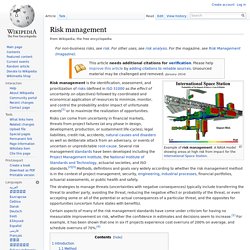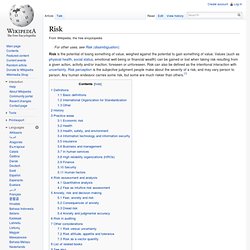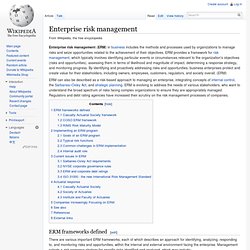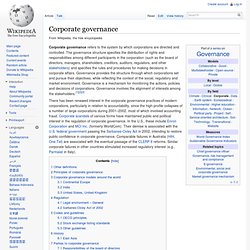

Epidemic. Risk management. Risk management is the identification, assessment, and prioritization of risks (defined in ISO 31000 as the effect of uncertainty on objectives) followed by coordinated and economical application of resources to minimize, monitor, and control the probability and/or impact of unfortunate events[1] or to maximize the realization of opportunities.

The strategies to manage threats (uncertainties with negative consequences) typically include transferring the threat to another party, avoiding the threat, reducing the negative effect or probability of the threat, or even accepting some or all of the potential or actual consequences of a particular threat, and the opposites for opportunities (uncertain future states with benefits).
Introduction[edit] A widely used vocabulary for risk management is defined by ISO Guide 73, "Risk management. Vocabulary. Risk management also faces difficulties in allocating resources. ISO 31000. ISO 31000 is a family of standards relating to risk management codified by the International Organization for Standardization.
The purpose of ISO 31000:2009 is to provide principles and generic guidelines on risk management. ISO 31000 seeks to provide a universally recognised paradigm for practitioners and companies employing risk management processes to replace the myriad of existing standards, methodologies and paradigms that differed between industries, subject matters and regions. Currently, the ISO 31000 family is expected to include: ISO 31000:2009 - Principles and Guidelines on Implementation[1]ISO/IEC 31010:2009 - Risk Management - Risk Assessment TechniquesISO Guide 73:2009 - Risk Management - Vocabulary ISO also designed its ISO 21500 Guidance on Project Management standard to align with ISO 31000:2009.[2]
Risk. Risk is the potential of losing something of value, weighed against the potential to gain something of value.

Values (such as physical health, social status, emotional well being or financial wealth) can be gained or lost when taking risk resulting from a given action, activity and/or inaction, foreseen or unforeseen. Risk can also be defined as the intentional interaction with uncertainty. Risk perception is the subjective judgment people make about the severity of a risk, and may vary person to person. Any human endeavor carries some risk, but some are much riskier than others.[1] Definitions[edit] Firefighters at work Risk can be defined in a variety of ways. Basic definitions[edit] The probability of something happening multiplied by the resulting cost or benefit if it does. International Organization for Standardization[edit] Enterprise risk management. Enterprise risk management (ERM) in business includes the methods and processes used by organizations to manage risks and seize opportunities related to the achievement of their objectives.

ERM provides a framework for risk management, which typically involves identifying particular events or circumstances relevant to the organization's objectives (risks and opportunities), assessing them in terms of likelihood and magnitude of impact, determining a response strategy, and monitoring progress. By identifying and proactively addressing risks and opportunities, business enterprises protect and create value for their stakeholders, including owners, employees, customers, regulators, and society overall. (ERM) ERM can also be described as a risk-based approach to managing an enterprise, integrating concepts of internal control, the Sarbanes–Oxley Act, and strategic planning.
ERM frameworks defined[edit] Casualty Actuarial Society framework[edit] Www.theirm.org/publications/documents/Risk_Management_Standard_030820.pdf. Corporate governance. There has been renewed interest in the corporate governance practices of modern corporations, particularly in relation to accountability, since the high-profile collapses of a number of large corporations during 2001–2002, most of which involved accounting fraud.

Corporate scandals of various forms have maintained public and political interest in the regulation of corporate governance. In the U.S., these include Enron Corporation and MCI Inc. (formerly WorldCom). Their demise is associated with the U.S. federal government passing the Sarbanes-Oxley Act in 2002, intending to restore public confidence in corporate governance. Comparable failures in Australia (HIH, One.Tel) are associated with the eventual passage of the CLERP 9 reforms. Other definitions[edit] Economic analysis has resulted in a literature on the subject.[11] One source defines corporate governance as "the set of conditions that shapes the ex post bargaining over the quasi-rents generated by a firm Continental Europe[edit]